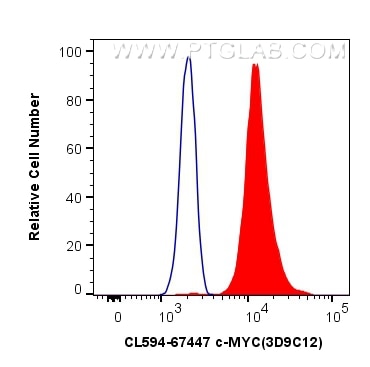Anticorps Monoclonal anti-c-MYC
c-MYC Monoclonal Antibody for FC (Intra)
Hôte / Isotype
Mouse / IgG1
Réactivité testée
Humain, rat, souris
Applications
FC (Intra)
Conjugaison
CoraLite®594 Fluorescent Dye
CloneNo.
3D9C12
N° de cat : CL594-67447
Synonymes
Galerie de données de validation
Applications testées
| Résultats positifs en cytométrie | cellules HeLa |
Dilution recommandée
| Application | Dilution |
|---|---|
| Flow Cytometry (FC) | FC : 0.40 ug per 10^6 cells in a 100 µl suspension |
| It is recommended that this reagent should be titrated in each testing system to obtain optimal results. | |
| Sample-dependent, check data in validation data gallery | |
Informations sur le produit
CL594-67447 cible c-MYC dans les applications de FC (Intra) et montre une réactivité avec des échantillons Humain, rat, souris
| Réactivité | Humain, rat, souris |
| Hôte / Isotype | Mouse / IgG1 |
| Clonalité | Monoclonal |
| Type | Anticorps |
| Immunogène | c-MYC Protéine recombinante Ag17519 |
| Nom complet | v-myc myelocytomatosis viral oncogene homolog (avian) |
| Masse moléculaire calculée | 49 kDa |
| Poids moléculaire observé | 55-60 kDa |
| Numéro d’acquisition GenBank | BC000141 |
| Symbole du gène | MYC |
| Identification du gène (NCBI) | 4609 |
| Conjugaison | CoraLite®594 Fluorescent Dye |
| Excitation/Emission maxima wavelengths | 588 nm / 604 nm |
| Forme | Liquide |
| Méthode de purification | Purification par protéine G |
| Tampon de stockage | PBS avec glycérol à 50 %, Proclin300 à 0,05 % et BSA à 0,5 %, pH 7,3. |
| Conditions de stockage | Stocker à -20 °C. Éviter toute exposition à la lumière. Stable pendant un an après l'expédition. L'aliquotage n'est pas nécessaire pour le stockage à -20oC Les 20ul contiennent 0,1% de BSA. |
Informations générales
MYC contains one basic helix-loop-helix (bHLH) domain. This protein is a multifunctional, nuclear phosphoprotein that plays a role in cell cycle progression, apoptosis and cellular transformation. It functions as a transcription factor that regulates transcription of specific target genes. It seems to activate the transcription of growth-related genes. It binds DNA in a non-specific manner, yet also specifically recognizes the core sequence 5'-CAC[GA]TG-3'. Mutations, overexpression, rearrangement and translocation of this gene have been associated with a variety of hematopoietic tumors, leukemias and lymphomas, including Burkitt lymphoma.
Protocole
| Product Specific Protocols | |
|---|---|
| FC protocol for CL594 c-MYC antibody CL594-67447 | Download protocol |
| Standard Protocols | |
|---|---|
| Click here to view our Standard Protocols |


